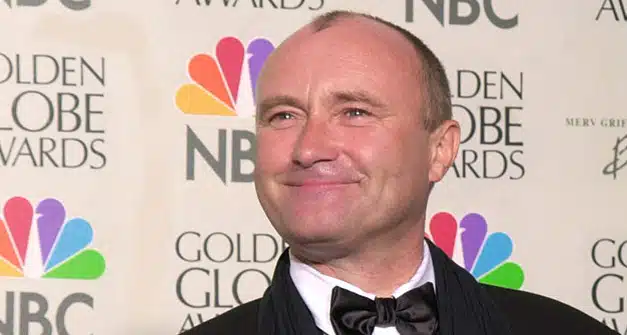Phil Collins, the celebrated drummer and lead singer of Genesis, has carved out a formidable legacy in the music industry. Alongside icons like Michael Jackson and Paul McCartney, Collins is one of the rare musicians who has sold over 100 million records both as a solo artist and collectively with his band. Born on January 30, 1951, in London, England, into a creative family, Collins was introduced to music from a young age.

His musical journey began at five when he received a makeshift drum kit from his uncle, complete with tambourines, triangles, cymbals, and drums. As the English beat scene emerged, led by influential bands like The Shadows, Collins found his calling and became a central figure in the movement, often performing at social gatherings hosted by his parents’ boating club.
By fourteen, Collins was captivated by rock and roll, purchasing a record player and The Beatles’ “Please Please Me.” He practiced drumming in front of a mirror, playing the record loudly, allowing him to drum without focusing on his actions. Despite taking lessons to read drum music—a skill deemed necessary for joining dance bands or orchestras—Collins soon realized he preferred to play intuitively.

His life changed dramatically in the 1970s when he responded to a job listing for a drummer with Genesis. His entry into the band marked the beginning of an illustrious career. When Genesis struggled to find a suitable lead singer, Collins stepped up, simultaneously mastering the art of singing while drumming, a feat that solidified his status as a musical legend.
Collins enjoyed massive success with Genesis and as a solo artist, producing hits like “I Don’t Care Anymore,” “In The Air Tonight,” and “You Can’t Hurry Love.” After 25 years with Genesis, he shifted focus to jazz, film scores, and solo projects. In 2017, he planned a reunion tour with Genesis for “The Last Domino?” tour, but it was postponed due to the pandemic. Health issues have since limited his ability to play drums, leading to his son Nicholas taking over drumming duties while Phil continues to sing.

Despite these challenges, Collins remains passionate about music. His story is a testament to adaptability and resilience in the face of physical limitations. He expressed mixed feelings about continuing to tour, acknowledging that some activities might be beyond his reach now. This realization has been difficult for Collins, as it involves weighing the love for his craft against the physical demands it entails.



